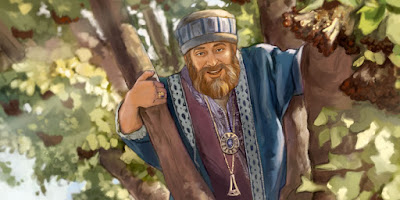Boundless love expressed in mercy.
November 3 2019: Thirty-first Sunday in Ordinary Time - C
A Moroccan proverb says, “The donkey has limited abilities,
but its love for carrot is boundless.”
The Lord’s mercy knows no limit. It is opened to all,
righteous as well as sinners. Those who experience that merciful love can in
return not contain it for themselves. They are pushed to give it out to others.
It happens times that my reflection goes to the deep meaning of the name of
Jesus, “God saves”. Then comes to me a question on salvation: Does God make any
selection or segregation in redeeming?
Today’s liturgy comes to provide an answer. God makes no
distinction, no classification, neither discrimination or segregation in his redemptive
mission. From the book of Genesis, we read that he created all things good and
out of love. Sin, however, through the evil one brought corruption into the
beautiful creation of God. Nevertheless, God won’t leave what he created under
the power of the evil. He wants to save all things, thus, without any
distinction. His mercy is an offer he makes to all.
The first reading clearly expresses that God loves all his
creatures. If that was not the case, he would have not created all things. And
because he loves all that he has created, the author of the Book of Wisdom can
affirm, “you have mercy on all, because you can do all things; and you overlook
people's sins that they may repent. For you love all things that are and loathe
nothing that you have made…” Nothing of the creation is concealed from God’s
love. We all are subjects of that love and mercy.
The Gospel gives a clear example that no one is excluded
from God’s love. This time, not through a parable, but through a factual
encounter, Jesus shows God’s love. We read from the scene of Jesus going at the
table of a marginalized man, Zacchaeus, the greatest expression of a boundless
and merciful love.
The way Jesus saw Zacchaeus, the chief of tax collectors,
teaches us a lot on how God sees each one of us. It also tells us how we should
learn to see others. Oftentimes, not only that physical appearance is a great
hindrance in our approach of people, but we also close them under etiquettes
and labels.
Zacchaeus, the main actor of today’s Gospel is presented as
a person with small physical statue. But, not only that physically he was
small, he was labeled with a spiritual wound: Public sinner. All the
ingredients were well assorted to prevent him to approach Jesus, and Jesus to
get close to him. God however, goes beyond the physic, small size and the
spiritual, sinner, to see deep inside him, a God seeker. Luke mentions, he “was
seeking to see who Jesus was; but he could not see him because of the crowd,
for he was short in stature…”
Jesus came to save all; mostly those who truly seek him,
despite their evilness. Our sins do not say who we are before God. God looks
not the evilness people see in you. You might well be a prostitute, a Don Juan,
a drunkard, a drug addicted, or what else. These are accidents or choices you
made in life. Instead, God looks and sees the goodness he himself has put in you
since the creation. For sure, sin has disfigured mankind, but it has not
cancelled in us the image of God. And so, though our physic and our spiritual
might prevent us approaching him, like Zacchaeus, we have the obligation to
defeat those boundaries. Like Zacchaeus, each one of us is called to look for a
tree giving him an advance on all external prejudices and speculations, climb
on it and expect the passing by of the Lord. The Lord who sees the good in
everyone will notice your inner identity, “this man too is a descendant of
Abraham…” and so, he loves you as you are. The meeting with Jesus is a
transforming and restorative encounter. Zacchaeus was thus transformed and
restored.
Speaking of the Lord’s coming, Paul in the
second reading warns against the false preachers who preach fake news; other
than the Gospel of love. Many pastors, today, have invented scary gospels
leading to the fear of God and not opening man to see and hold on his love. God
has not created us for damnation. He wants to save all. Therefore, if someone
preaches to you that, because you are sinner, God will never forgive you and
save you, remember always those words of Jesus to the Pharisees, “For the Son
of Man has come to seek and to save what was lost.” You are sinner! Rejoice and
be glad, for, it is for you and I, sinners that Jesus came. He is “God saves”.
His love goes beyond your sins. He only wants you to seek him with sincere
heart and to repent from evilness.





Comments
Post a Comment